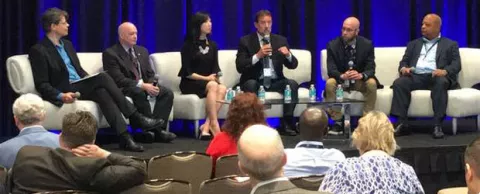
Could your city use help getting a smart city agenda on fast-forward? Representatives of the five cities that won 2017 Smart Cities Council Readiness Challenge Grants flew to Santa Clara last week to fill Smart Cities Week Silicon Valley participants in on some of the lessons they've learned about driving smart city initiatives. Since there's still time to prep your city for a shot at the 2018 grant program, which will launch in October during the Council's third annual Smart Cities Week conference and exhibition in Washington, D.C., we've highlighted a few potentially helpful insights below. – Liz Enbysk
The cities of Austin, Indianapolis, Miami, Orlando and Philadelphia won 2017 Challenge Grants, which include year-long feedback and guidance from Council experts, a tailored Readiness Workshop as well as a host of supporting products and services. Representatives from the five winning cities who shared insights at Smart Cities Week SV included:
- Kevin Burns, Chief Information Officer, Information Technology Department, Miami
- Ellen Hwang, Program Manager for Innovation Management, Philadelphia
- Ted Lehr, Data Architect, Austin
- Bryan Luellen, Director of Public Affairs, IndyGo, the Indianapolis Public Transportation Corp.
- Charles Ramdatt, Project Manager, Public Works Department, Orlando
Stuart Cowan, Council Chief Scientist and administrator of the grant program, moderated the discussion.
On where to start
With limited budgets, cities have to pick and choose carefully where to allocate resources. In Austin, Lehr said leaders initially talked about focusing its challenge grant on modernizing the airport, but eventually decided to see how it could improve the lives of the city's poor and minority communities where help is needed most. Smartness, Lehr suggested, has to start in places that have the greatest challenges.
Ramdatt said Orlando wants its brand to be associated with a smart cities vision and projects. But, he said, "we have to bring everyone else along," meaning neighboring cities, counties and the private sector. To encourage that, he said they're doing demonstration projects around sustainability.
On engaging with vendors
In Philadelphia, Hwang says the city had under-utilized Wi-Fi assets and went to the vendor community with an RFI asking what Philly could look like as a smart city. She says they got over 100 responses, which got city leadership excited. Not only did they get ideas, she said they also saw opportunities to leverage the RFI process to open up communications between vendors and city government.
Breaking down barriers in procurement methods is also essential, said Miami CIO Burns, noting that purchasing smart technology isn't the same as buying a fire truck. Lehr also advocated changing procurement practices to make it easier for start-ups to apply for city projects.
Public-private partnerships with incentives that reward performance should also be considered, added Ramdatt.
Luellen, of Indianapolis, said that while his city has done public-private partnerships very well, it is also very under-resourced and trying to serve a large geographic area. That makes working together and collaborating with the tech community all the more important.
On facing challenges
Orlando is a mid-size city with big-city challenges, Ramdatt said. Chief among them is being the world's largest tourism market, which means the city must accommodate the needs of tourists and at the same time ensure the needs of its residents are met. He said the city decided it must focus comprehensively on what it can do to engage and serve both visitors and residents and found inspiration in Dubai's focus on happiness.
Hwang said one outcome of the challenge grant process was bringing city departments together to compile a big list of who is doing what in the city. Now she says Philadelphia is seeing more cross-departmental collaboration and examples of thinking differently about where opportunities exist in the city.
With the sea level rising, resiliency is top of mind in Miami, Burns said. The city will use its challenge grant, in part, to find smart solutions to mitigate flooding.
But like so many other cities, Miami finds it difficult to compete with the private sector in attracting personnel and often has to contract with outside agencies. It's a paradigm shift, Burns said, that requires encouraging city departments to think in new ways – and in innovative ways. Burns believes innovation is everyone's role in a city and that rewarding people with innovative ideas is good practice.
Lehr suggested another challenge in getting momentum behind smart city initiatives is having the conversation at the right level. You want executives and staff engaged, but speaking too technically can overwhelm them.
And Luellen said that individual departments and staff may "get it," but for cities like his without an innovation office or CTO to own a smart city project, a broad understanding of the higher-level vision and integration may be lacking.
More from Smart Cities Week SV:
What's next for smart cities? 4 leaders speak
Congresswoman urges Smart Cities Week participants to “keep thinking big”
Small towns can be smart cities too



